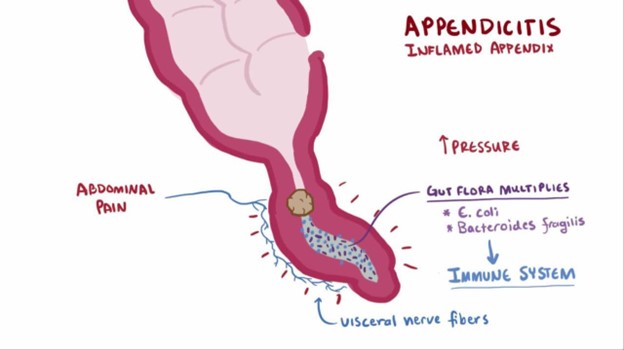A nurse is caring for a child who has suspected appendicitis. Which of the following provider prescriptions should the nurse clarify?
Monitor oral temperature every 4 hr.
Administer sodium biphosphate/sodium phosphate.
Maintain NPO status.
Medicate the client for pain every 4 hr as needed.
The Correct Answer is B
The nurse should clarify the prescription to administer sodium biphosphate/sodium phosphate because it is a laxative and is contraindicated in a child with suspected appendicitis. The use of laxatives or enemas can potentially worsen the condition by increasing the risk of perforation or rupture of the inflamed appendix.
A. Monitoring oral temperature every 4 hours is important to assess for signs of infection or worsening condition.
C. Maintaining NPO status is essential to avoid stimulating the digestive system and to prepare for possible surgery.
D. Medicating the client for pain every 4 hours as needed is appropriate to manage pain and provide comfort while the child awaits further evaluation or treatment.
Remember, it's crucial to avoid the use of laxatives, enemas, or any other interventions that can potentially aggravate the inflamed appendix in a child with suspected appendicitis.

Nursing Test Bank
Naxlex Comprehensive Predictor Exams
Related Questions
Correct Answer is D
Explanation
When caring for a child with acute appendicitis, the nurse should anticipate an elevated white blood cell count (WBC) in the laboratory values. A high WBC count is a common finding in acute appendicitis, as it indicates an inflammatory response and infection in the body. The body's immune system responds to the inflammation caused by the infected appendix, leading to an increase in WBCs to fight off the infection.
The other options are not necessarily specific to acute appendicitis:
A. RBC 4.2 million/mm³: The red blood cell count (RBC) measures the number of red blood cells in the bloodstream. This value may be within the normal range, but it is not the primary marker for diagnosing or monitoring acute appendicitis.
B. Lymphocytes 3,000/mm3: Lymphocytes are a type of white blood cell involved in the body's immune response. While changes in lymphocyte levels can occur during inflammation, it is not the primary marker for diagnosing or monitoring acute appendicitis.
C. Neutrophils 3.000/mm³: Neutrophils are a type of white blood cell that increases in response to infection and inflammation. However, the absolute neutrophil count is not as relevant as the overall WBC count in determining the presence and severity of acute appendicitis.
Correct Answer is A
Explanation
Children with sickle cell anemia are prone to dehydration, which can worsen the sickling of red blood cells and trigger a sickle cell crisis. Therefore, it is essential to maintain good hydration to prevent crises. Offering fluids to the child multiple times every day helps to keep them well-hydrated.
Option B is not necessary unless there is a specific medical reason to restrict outdoor play. Regular play is essential for a child's physical and emotional development.
Option C is important, but it is not specific to discharge teaching after an acute crisis episode. Monitoring the child's temperature daily is essential to detect early signs of infection, which can be a trigger for sickle cell crises.
Option D is not recommended because applying cold compresses can cause vasoconstriction and may worsen pain in children with sickle cell anemia. Heat therapy, warm compresses, or a warm bath are more appropriate for pain relief during a sickle cell crisis. However, pain management should be discussed with the healthcare provider to ensure the most appropriate approach for the individual child's needs.
Whether you are a student looking to ace your exams or a practicing nurse seeking to enhance your expertise , our nursing education contents will empower you with the confidence and competence to make a difference in the lives of patients and become a respected leader in the healthcare field.
Visit Naxlex, invest in your future and unlock endless possibilities with our unparalleled nursing education contents today
Report Wrong Answer on the Current Question
Do you disagree with the answer? If yes, what is your expected answer? Explain.
Kindly be descriptive with the issue you are facing.
